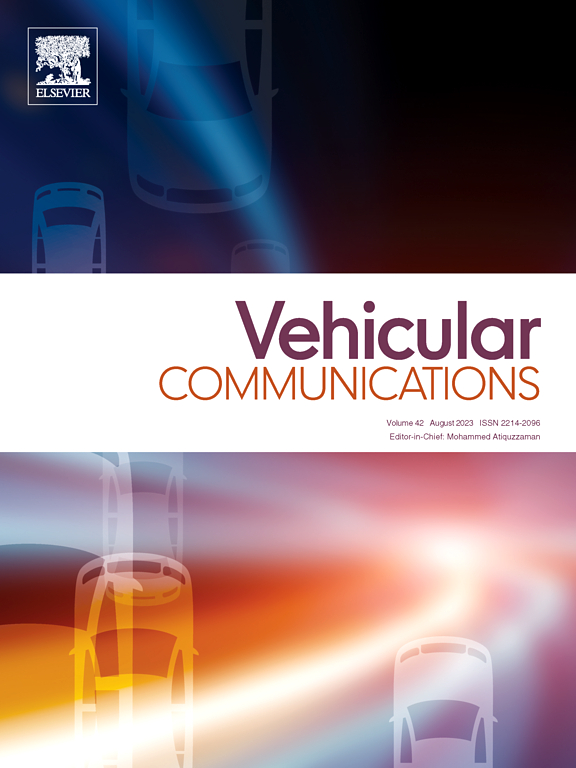Decentralized multi-hop data processing in UAV networks using MARL
IF 5.8
2区 计算机科学
Q1 TELECOMMUNICATIONS
引用次数: 0
Abstract
Unmanned Aerial Vehicles (UAVs) have become integral to numerous applications, prompting research towards enhancing their capabilities. For time-critical missions, minimizing latency is crucial; however, current studies often rely on sending data to ground station or cloud for processing due to their limited onboard capacities. To leverage the networking capabilities of UAVs, recent research focuses on enabling data processing and offloading within the UAV network for coordinated decision-making. This paper explores a multi-hop data offloading scheme designed to optimize the task processing and resource management of UAVs. The proposed distributed strategy uses multi-agent reinforcement learning, where UAVs, each with varying computational capacities and energy levels, process and offload tasks while managing energy consumption and latency. The agents, represented as actor-critic models, learn and adapt their actions based on current state and environment feedback. The study considers a consensus-based method to update learning weights, promoting cooperative behavior among the agents with minimum interaction. Through multiple training episodes, the agents improve their performance, with the overall system achieving faster convergence with high rewards, demonstrating the viability of decentralized data processing and offloading in UAV networks.
利用 MARL 在无人机网络中进行分散式多跳数据处理
无人驾驶飞行器(UAV)已成为众多应用中不可或缺的一部分,促使人们研究如何增强其能力。对于时间紧迫的任务来说,最大限度地减少延迟至关重要;然而,由于无人机的机载能力有限,目前的研究通常依赖于将数据发送到地面站或云端进行处理。为了充分利用无人机的网络能力,最近的研究重点是在无人机网络内实现数据处理和卸载,以便协调决策。本文探讨了一种多跳数据卸载方案,旨在优化无人机的任务处理和资源管理。所提出的分布式策略采用多代理强化学习,每个无人机都具有不同的计算能力和能量水平,在处理和卸载任务的同时管理能量消耗和延迟。代理以行为批判模型为代表,根据当前状态和环境反馈来学习和调整自己的行动。研究考虑了一种基于共识的方法来更新学习权重,以最小的互动促进代理之间的合作行为。通过多次训练,代理提高了性能,整个系统实现了快速收敛和高回报,证明了无人机网络中分散式数据处理和卸载的可行性。
本文章由计算机程序翻译,如有差异,请以英文原文为准。
求助全文
约1分钟内获得全文
求助全文
来源期刊

Vehicular Communications
Engineering-Electrical and Electronic Engineering
CiteScore
12.70
自引率
10.40%
发文量
88
审稿时长
62 days
期刊介绍:
Vehicular communications is a growing area of communications between vehicles and including roadside communication infrastructure. Advances in wireless communications are making possible sharing of information through real time communications between vehicles and infrastructure. This has led to applications to increase safety of vehicles and communication between passengers and the Internet. Standardization efforts on vehicular communication are also underway to make vehicular transportation safer, greener and easier.
The aim of the journal is to publish high quality peer–reviewed papers in the area of vehicular communications. The scope encompasses all types of communications involving vehicles, including vehicle–to–vehicle and vehicle–to–infrastructure. The scope includes (but not limited to) the following topics related to vehicular communications:
Vehicle to vehicle and vehicle to infrastructure communications
Channel modelling, modulating and coding
Congestion Control and scalability issues
Protocol design, testing and verification
Routing in vehicular networks
Security issues and countermeasures
Deployment and field testing
Reducing energy consumption and enhancing safety of vehicles
Wireless in–car networks
Data collection and dissemination methods
Mobility and handover issues
Safety and driver assistance applications
UAV
Underwater communications
Autonomous cooperative driving
Social networks
Internet of vehicles
Standardization of protocols.
 求助内容:
求助内容: 应助结果提醒方式:
应助结果提醒方式:


